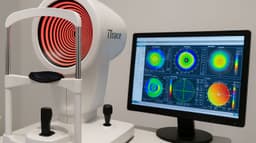
Managing Screen Time For Adults To Help Protect Your Eyesight
In today's fast-paced world, most adults often find themselves tethered to screens for both work and leisure, with smartphones, computers, and tablets becoming ubiquitous companions. However, the incessant exposure to digital screens comes at a cost, particularly when it comes to eye and vision health. As adults juggle the demands of work, social media, and entertainment, the cumulative effects of excessive screen time can take a toll on their eyesight and overall well-being. Let's explore the importance of managing screen time for all adults and delve into the negative effects of prolonged screen exposure on eye health, highlighting the importance of striking a balance in the digital age.
10 Negative Effects Of Excessive Screen Time On Eye Health
Here are My-iClinic's top 10 negative effects of excessive screen time on eye health and tips for monitoring them successfully:
1. Digital Eye Strain
Prolonged screen use can lead to digital eye strain, characterised by symptoms like dryness, irritation, and fatigue. To monitor and alleviate digital eye strain, practice the 20-20-20 rule: every 20 minutes, look away from the screen at something 20 feet away for at least 20 seconds.
2. Computer Vision Syndrome (CVS)
CVS encompasses a range of eye and vision problems caused by prolonged computer use, including eye strain, headaches, and blurred vision. To combat CVS, ensure proper ergonomics at your workstation, including adequate lighting and screen positioning.
3. Blue Light Exposure
Screens emit blue light, which can disrupt sleep patterns and contribute to eye strain and fatigue. Consider using blue light filters on your devices or wearing blue light-blocking glasses to reduce exposure, especially in the evening hours.
4. Dry Eyes
Staring at screens reduces blink rates, leading to inadequate lubrication of the eyes and dryness. Combat dry eyes by consciously blinking more frequently and using lubricating eye drops as needed.
5. Eye Fatigue
Extended screen time can lead to eye fatigue, characterised by tired, achy eyes and difficulty focusing. Take breaks from screens, practice relaxation techniques such as eye massages, and ensure adequate hydration to alleviate eye fatigue.

6. Reduced Blink Rate
Focusing intently on screens can cause individuals to blink less frequently, leading to dryness and discomfort. Use reminders or timer apps to prompt regular blinking and encourage natural lubrication of the eyes.
7. Increased Risk of Myopia
Studies have linked excessive screen time, particularly in children and young adults, to an increased risk of myopia (nearsightedness). Encourage outdoor activities and limit screen time, especially for younger individuals, to mitigate the risk of myopia development.
8. Eye Muscle Imbalance
Prolonged screen use can lead to imbalances in the muscles responsible for eye movement and focusing, contributing to eye strain and discomfort. Practice eye exercises and stretches to strengthen and relax the eye muscles, promoting better visual comfort.
9. Poor Posture
Extended screen time often accompanies poor posture, leading to neck and shoulder pain, as well as eye strain. Maintain proper posture while using screens, including positioning screens at eye level and taking regular breaks to stretch and realign.
10. Digital Addiction
Excessive screen time can contribute to digital addiction, characterised by compulsive use of digital devices and neglect of real-world activities. Set boundaries and establish screen-free times and zones to promote a healthy balance between digital and offline activities.
By being mindful of these negative effects and implementing strategies to monitor and mitigate them, adults can effectively manage their screen time and safeguard their eye health in today's digital age.
Managing Screen Time Better
First, establish boundaries and set limits on screen use by creating a schedule that allocates specific times for work, leisure, and screen-free activities. Designate screen-free zones in your home, such as the bedroom or dining area, to promote relaxation and social interaction without digital distractions. Additionally, consider implementing technology tools, such as screen time tracking apps or website blockers, to monitor and regulate your screen usage. By proactively managing your screen time and setting clear boundaries, you can cultivate a healthier balance between digital engagement and offline activities.

Secondly, prioritise activities that promote physical activity, social connection, and mental well-being over passive screen consumption. Engage in outdoor pursuits, exercise routines, or hobbies that provide opportunities for movement and relaxation away from screens. Foster meaningful connections with friends and family through face-to-face interactions or phone calls, rather than relying solely on digital communication channels. Moreover, allocate time for activities that nourish your mind and soul, such as reading, meditation, or creative pursuits, which offer respite from the constant stimulation of screens. By consciously investing in alternative activities that enrich your life beyond screens, you can cultivate a more balanced and fulfilling lifestyle.
Free Screen Time Planner
| Timeframe | Recommended Screen Time | Suggested Breaks | Additional Tips |
|---|---|---|---|
| Daily | 1.5 - 2 hours of continuous screen time for work or entertainment | Follow the 20-20-20 rule: every 20 minutes, take a 20-second break to look at something 20 feet away | Use blue light filters, adjust screen brightness to match the lighting in the room, and maintain proper posture |
| Weekly | Limit screen time to 14 - 15 hours per week for entertainment and social media, in addition to work | For every hour of screen time, take a 10-15 minute break to stretch, hydrate, and rest your eyes | Schedule “screen-free” days or evenings to engage in offline activities like reading, exercise, or socializing |
| Monthly | Aim for no more than 60 hours of total screen time per month for non-work activities | Plan at least one full day per month without any screen use (digital detox) | Review your screen time habits monthly to identify areas for improvement and make adjustments accordingly |
| General | Work: 6 - 8 hours per day for work-related tasks (if using a screen for work) | Take a 15-minute break every 2 hours of work screen time | Ensure good ergonomics (e.g., screen at eye level, chair with lumbar support) to prevent strain |
Reaching For The Future
In worst-case scenarios where individuals experience severe vision problems due to factors like age-related degeneration or prolonged screen time, modern technology offers innovative solutions to restore and enhance vision. Laser eye surgery, for example, has revolutionised the field of ophthalmology, providing a safe and effective means of correcting refractive errors such as myopia, hyperopia, and astigmatism. With advanced laser techniques and meticulous surgical procedures, individuals can undergo vision correction procedures tailored to their specific needs, reclaiming clear and crisp vision. Moreover, advancements in intraocular lens technology have enabled surgeons to address age-related vision issues such as cataracts and presbyopia, offering customised lens replacement options to improve visual acuity and restore quality of life.

Age-related vision degeneration, exacerbated by factors such as prolonged screen time and digital device usage, poses significant challenges for individuals as they grow older. Research indicates that the prevalence of age-related eye conditions, including cataracts, macular degeneration, and glaucoma, increases with advancing age, underscoring the importance of proactive eye care measures. Furthermore, excessive screen time and prolonged exposure to blue light emitted by digital devices have been linked to digital eye strain and accelerated age-related vision decline. As individuals age, it becomes imperative to prioritise regular eye examinations, adopt healthy lifestyle habits, and leverage modern technological advancements such as laser eye surgery to address vision concerns and maintain optimal eye health for years to come.
A Rapid Pace
As technology continues to advance at a rapid pace, it's crucial for individuals to remain informed about the potential impacts of modern devices on their vision health. While technologies like smartphones, computers, and tablets offer convenience and connectivity, they also pose risks to eye health if used excessively or improperly. By adopting proactive measures such as managing screen time, practising proper ergonomics, and seeking timely eye care, individuals can mitigate the negative effects of modern technology on their vision. Moreover, embracing innovative solutions like laser eye surgery and intraocular lens technology can provide hope and assistance for individuals facing vision challenges, offering tailored treatments to enhance visual acuity and improve quality of life. Ultimately, by prioritising eye health and leveraging the benefits of modern technology wisely, individuals can enjoy clear vision and optimal eye health well into the future.

A Helping Hand
Experience the future of vision care with My-iClinic. As pioneers in the field of ophthalmology, we are committed to harnessing the latest technological advancements to deliver unparalleled results for our patients. Say goodbye to vision challenges caused by modern technology and embrace a clearer, brighter future with our state-of-the-art treatments.
At My-iClinic, we utilise cutting-edge technologies such as advanced laser eye surgery techniques and innovative intraocular lens options to address a wide range of vision concerns, from refractive errors to age-related degeneration. Our team of experienced surgeons and specialists are dedicated to providing personalised care and achieving the best possible outcomes for every patient.
Don't let technology dictate the quality of your vision—take control of your eye health with My-iClinic. Schedule your consultation today and discover how our expertise and state-of-the-art technology can transform your vision and enhance your quality of life.
Find out more by Speaking to our team









